What Are the Unique Needs of Angora Rabbits?
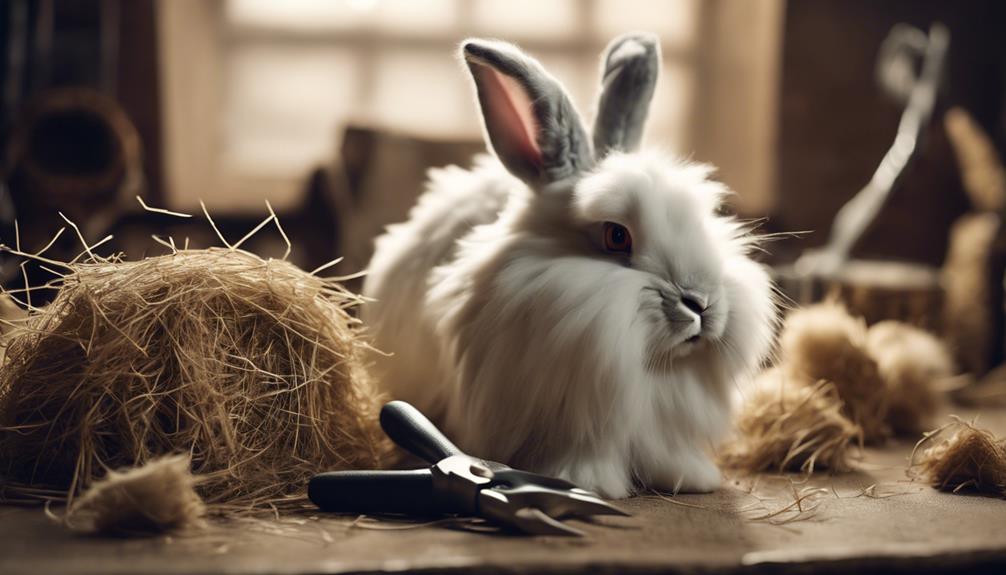
Angora rabbits have unique needs due to their exquisite coats. These rabbits require a specific diet to maintain the health of their fur, which includes high-quality hay and fresh vegetables. Regular grooming is essential to prevent matting and keep their coats in top condition. Additionally, Angora rabbits need a clean and spacious living environment to thrive. Proper care and attention are necessary to ensure the well-being of these beautiful creatures.
Understanding and meeting the specialized needs of Angora rabbits is crucial for their health and happiness. By providing the right diet, grooming, and living conditions, owners can help their rabbits maintain their luxurious coats and overall well-being. Dedication and commitment to meeting these unique requirements are essential for those considering Angora rabbits as pets.
Health Considerations for Angora Rabbits
When caring for Angora rabbits, attention to their health is paramount due to their susceptibility to specific conditions like woolblock. Angora rabbits, known for their luxurious wool, are prone to developing woolblock, a serious health issue that arises when they ingest their own wool. This can lead to various complications, including skin sores, infections, and potentially life-threatening conditions if left untreated.
To prevent such health risks, regular grooming and wool maintenance are essential. Immediate removal of matted or excess wool is necessary to avoid these health complications. Neglecting the wool of Angora rabbits can result in skin sores and other related problems.
Along with grooming, providing a high-fiber diet is crucial for their well-being. Ensuring a clean living environment and proper parasite control are also vital aspects of maintaining the health of Angora rabbits. By paying close attention to grooming, wool maintenance, and diet, owners can help their Angora rabbits lead healthy and happy lives.
Dietary Requirements for Angora Rabbits

To ensure the optimal health and well-being of Angora rabbits, it's essential to understand and meet their specific dietary requirements.
- Angora rabbits require a high-fiber diet to prevent wool blockage, with hay being a primary component.
- Providing fresh forage, grasses, and vegetables is crucial to ensure a balanced diet for Angora rabbits.
- Rabbit pellets labeled as Performance or Show can supplement their diet with necessary nutrients.
- It's important to monitor the rabbit's weight and adjust its diet accordingly to maintain its health.
Angora rabbits thrive on a diet rich in fiber, mainly sourced from hay. Fresh forage and vegetables add essential nutrients to their diet, promoting overall well-being. Supplementing with rabbit pellets can ensure they receive all necessary nutrients. Regularly monitoring the rabbit's weight allows for adjustments to be made promptly, catering to its individual dietary needs.
Behavioral Traits of Angora Rabbits
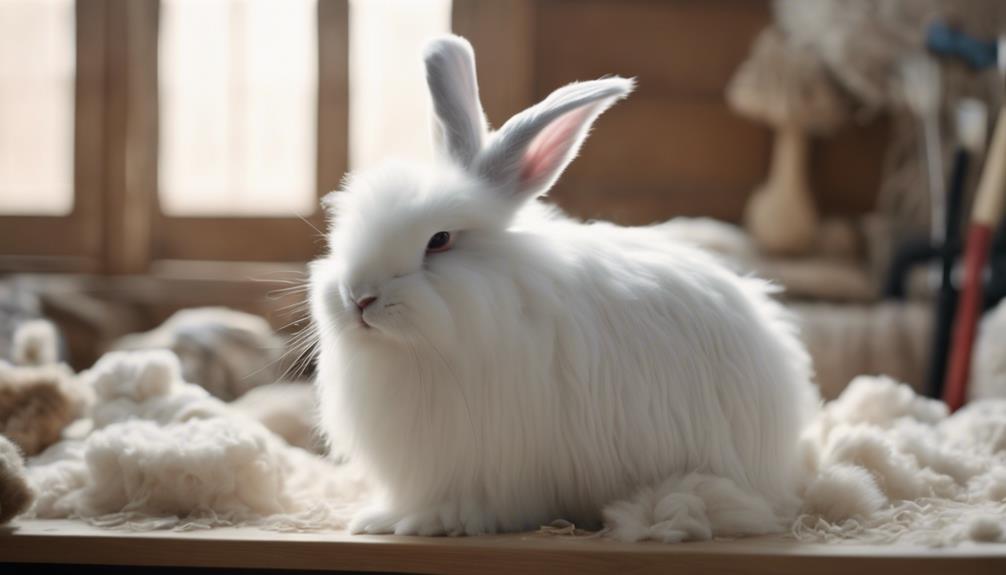
Angora rabbits exhibit a range of intriguing behavioral traits that showcase their intelligence and social nature, emphasizing the need for mental stimulation and interaction for their overall well-being. These social animals communicate through specific body language cues, such as thumping their hind legs when startled or upset. Angoras can be trained to use a litter box, respond to their name, and even perform simple tricks, highlighting their cognitive abilities.
It's crucial to monitor their behavior closely as delicate animals to prevent injuries, as they can easily harm themselves. While respecting their need for independence, providing regular grooming and handling is essential to maintain their well-being. Understanding and responding to their behavioral cues can foster a strong bond between owners and Angora rabbits, ensuring a happy and enriched environment for these intelligent creatures.
Grooming Tips for Angora Rabbits
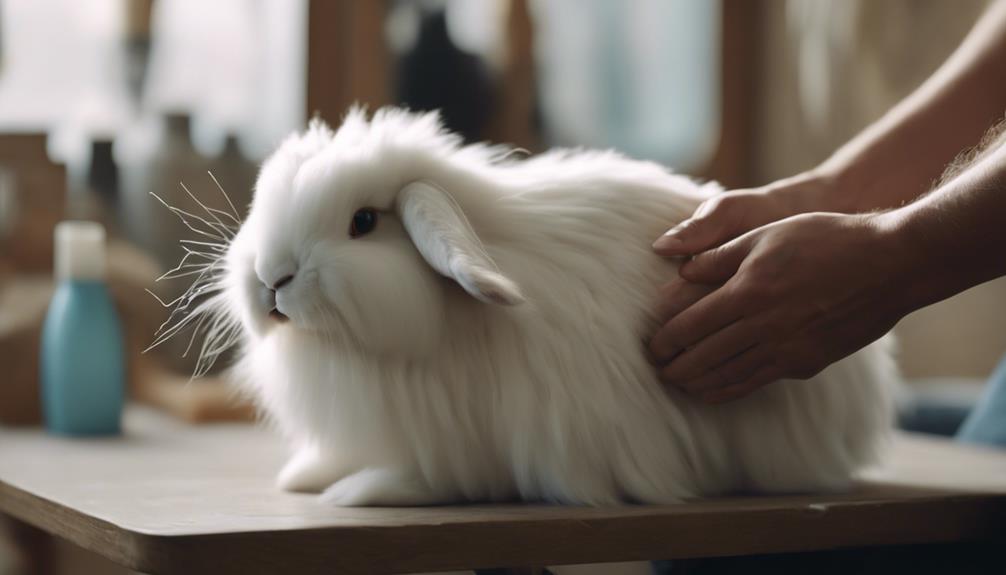
Regular grooming is essential for maintaining the health and appearance of Angora rabbits, requiring specific tools and techniques to care for their fluffy coats effectively. Here are some grooming tips to keep your Angora rabbit in top condition:
- Dedicate time: Weekly grooming sessions, lasting about an hour, are crucial to prevent matting and maintain the rabbit's overall well-being.
- Use the right tools: Gentle mat removal tools and pet blowers can assist in grooming Angora rabbits without causing them distress.
- Start grooming early: Introduce grooming from a young age to help Angora rabbits acclimate to handling and reduce stress during grooming sessions.
- Prevent wool block: Proper grooming is vital to prevent wool block, a condition where rabbits ingest their wool, potentially leading to digestive issues.
Housing Needs for Angora Rabbits

Angora rabbits require spacious, climate-controlled indoor housing to ensure their well-being.
It's recommended to provide individual wire cages to prevent wool matting and maintain grooming.
Additionally, proper temperature control, bedding, and nesting areas are crucial for their comfort and health.
Cage Size Requirements
To meet the unique housing needs of Angora rabbits, it's essential to provide a cage size of at least 3 x 2.5 feet to ensure ample space for movement and comfort. Here are some reasons why cage size requirements are crucial for Angora rabbits:
- Adequate space promotes natural behaviors: A spacious cage allows Angora rabbits to hop and stretch freely.
- Prevention of stress-related issues: Larger cages help in preventing stress-related behaviors and health problems in Angora rabbits.
- Exercise and muscle tone: Adequate space is essential for these rabbits to exercise, maintain muscle tone, and overall mental well-being.
- Health and happiness: Proper housing with ample space creates a healthy and happy environment for Angora rabbits to thrive.
Bedding and Nesting
An essential aspect of providing optimal housing for Angora rabbits is ensuring their bedding and nesting areas meet specific comfort and health requirements. Angoras require bedding made of soft materials such as hay, straw, or paper-based bedding to ensure comfort and insulation.
Nesting areas should be warm, dry, and draft-free to maintain the health and well-being of Angora rabbits. It's crucial to change the bedding regularly to uphold cleanliness and prevent health issues like respiratory problems or skin infections.
Providing nesting boxes filled with soft bedding material allows Angoras to create secure and cozy spaces for rest and relaxation. Proper bedding and nesting areas are vital for Angora rabbits to exhibit natural behaviors like burrowing and nesting.
Temperature Control
Proper temperature control is essential for maintaining the health and well-being of Angora rabbits in their housing environment. When it comes to temperature regulation in indoor housing for Angora rabbits, there are crucial factors to consider:
- Angora rabbits require climate-controlled environments, especially in cold climates, to prevent health issues.
- Housing should offer protection from extreme temperatures to safeguard the rabbit's well-being.
- Temperature control is vital for Angora rabbits as they're prone to heat stress and cold-related illnesses.
- Maintaining the appropriate temperature in their living space is key to ensuring the comfort and health of Angora rabbits.
Exercise Needs of Angora Rabbits
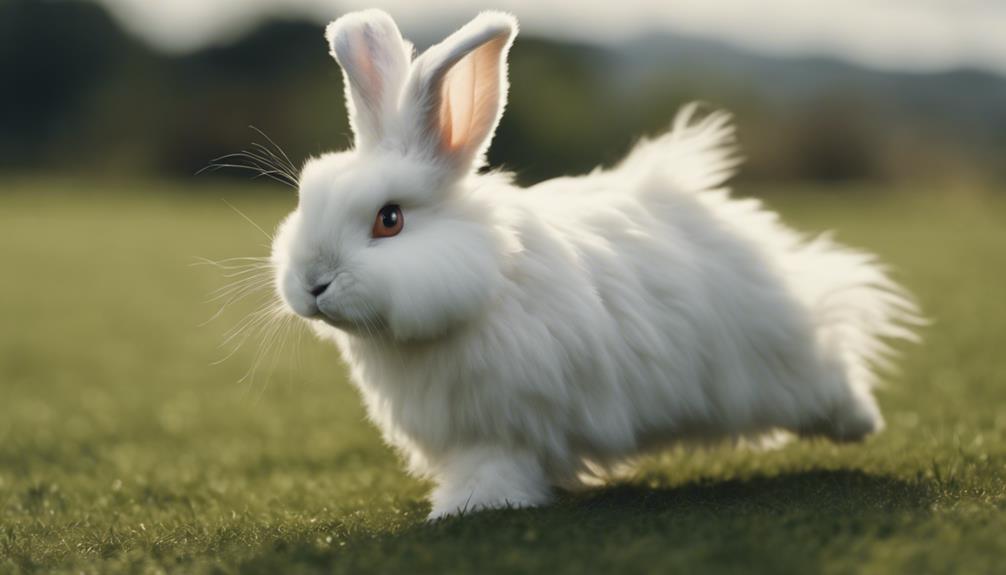
Angora rabbits have high exercise requirements, needing at least 3-4 hours of physical activity daily to maintain their health and prevent obesity.
Providing a secure and spacious area, whether indoors with toys and tunnels or outdoors in a bunny-proofed yard, is crucial to meet their energetic needs.
Regular exercise not only keeps Angora rabbits physically fit but also stimulates their minds, prevents boredom, and fosters a strong bond with their owners.
Indoor Exercise Options
Indoor exercise options play a crucial role in meeting the exercise needs of Angora rabbits, ensuring they stay healthy and mentally stimulated. To provide the best indoor exercise environment for Angora rabbits, consider the following options:
- Playpens: Setting up a spacious playpen allows Angora rabbits to move freely and engage in physical activities.
- Tunnels: Incorporating tunnels in their play area encourages natural behaviors like digging and exploring.
- Toys: Interactive toys such as treat balls and puzzle feeders promote mental stimulation and physical exercise.
- Spacious Area: Offering a large, rabbit-proofed space ensures they've enough room to hop around and play freely.
Outdoor Play Opportunities
To ensure the overall health and well-being of Angora rabbits, it is essential to provide them with supervised outdoor play opportunities that cater to their exercise and mental stimulation needs. Outdoor playtime should take place in a secure, fenced area to prevent escape and exposure to predators. This environment allows Angora rabbits to engage in natural behaviors such as hopping, exploring, and foraging, promoting muscle development and preventing obesity. Regular outdoor exercise not only supports their physical health but also enhances their mental well-being by reducing stress and preventing boredom. Providing a safe outdoor space for Angora rabbits to play is crucial in maintaining their overall quality of life.
| Aspect | Description |
|---|---|
| Location | Secure, fenced outdoor area |
| Activities | Hopping, exploring, foraging |
| Benefits | Muscle development, prevention of obesity |
Socialization Requirements for Angora Rabbits
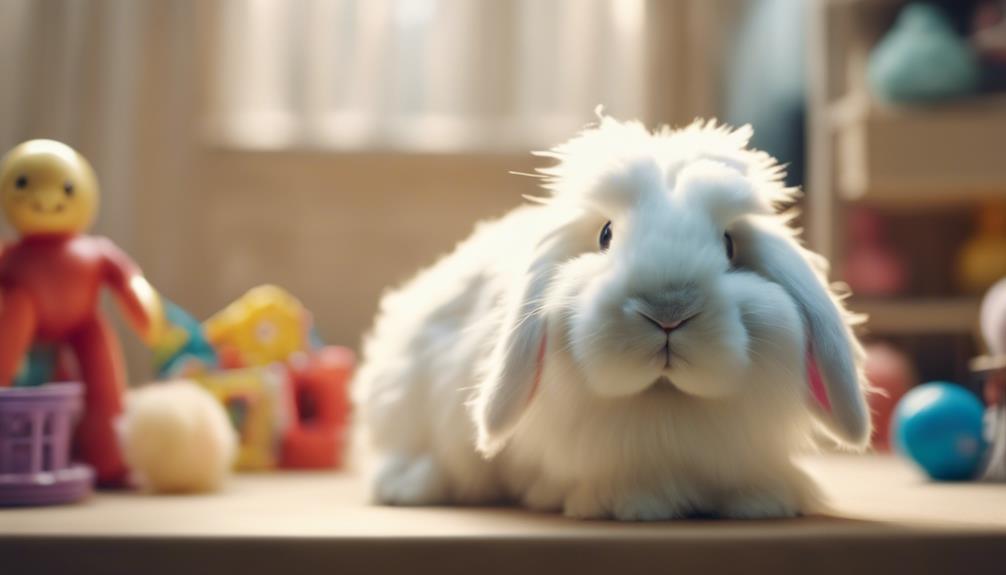
Daily social interaction is essential for the well-being and mental health of Angora rabbits. These social creatures require regular engagement to prevent boredom and ensure mental stimulation.
Here are four key aspects of socialization requirements for Angora rabbits:
- Companionship: Angora rabbits thrive on companionship and benefit greatly from being kept with another friendly rabbit for social interaction. This helps meet their social needs and provides them with a sense of security and comfort.
- Behavioral Issues: Lack of socialization can lead to various behavioral issues such as aggression, depression, or excessive chewing. Regular interaction with owners and companions can help prevent these problems.
- Playtime: Engaging in playtime activities with Angora rabbits, such as providing toys and safe spaces for exploration, not only keeps them physically active but also mentally stimulated. This helps in maintaining their overall well-being.
- Bonding: Socialization through petting and gentle handling aids in building trust between the owner and the Angora rabbit. This strengthens the bond between them and contributes to a positive relationship based on mutual respect and understanding.
Frequently Asked Questions
What Are the Unique Features of Angora Rabbits?
Angora rabbits stand out due to their long, silky wool, requiring regular grooming to prevent matting. They prefer a diet rich in fiber and need spacious housing for exercise. Owners should be mindful of their temperature sensitivity and provide mental stimulation.
What Do You Need for an Angora Rabbit?
An Angora rabbit needs a spacious cage with a solid floor, grooming tools like slicker brushes and clippers, a diet of hay, water, pellets, and veggies, exercise through play, special health care, gentle handling, and bonding activities for their well-being.
What Do Angora Rabbits Like to Play With?
Angora rabbits enjoy a variety of toys, such as plush items for snuggling and grooming, interactive toys like puzzle feeders for mental stimulation, and rotating new toys to prevent boredom. Providing enriching playtime is essential for their well-being.
What Are the Benefits of Angora Rabbits?
Angora rabbits offer a diverse range of benefits, from their luxurious wool for fiber production to bonding opportunities. Their soft fur requires regular grooming, specific diet preferences, and attention to health considerations, as they are sensitive to temperature changes.









